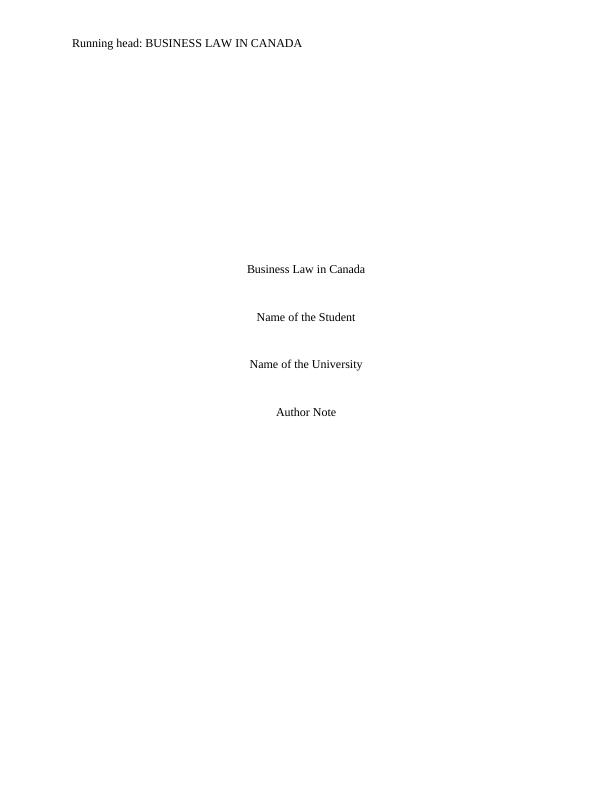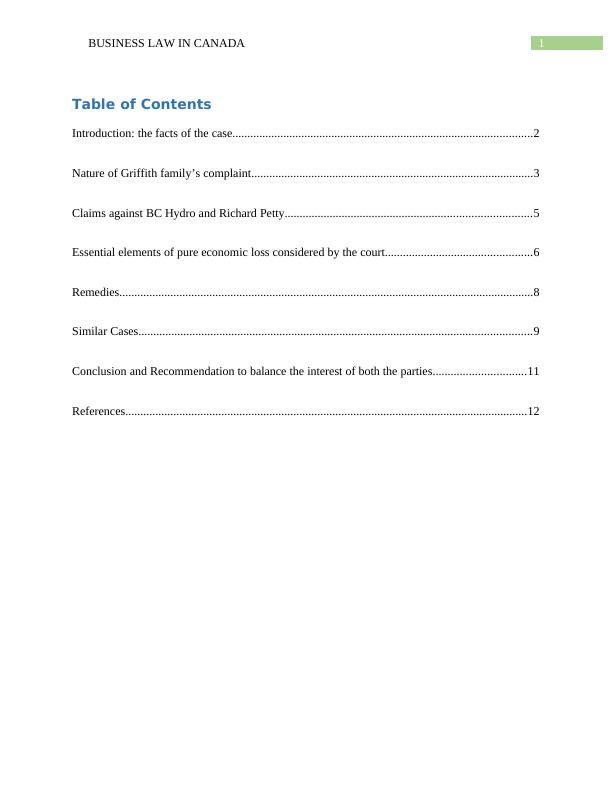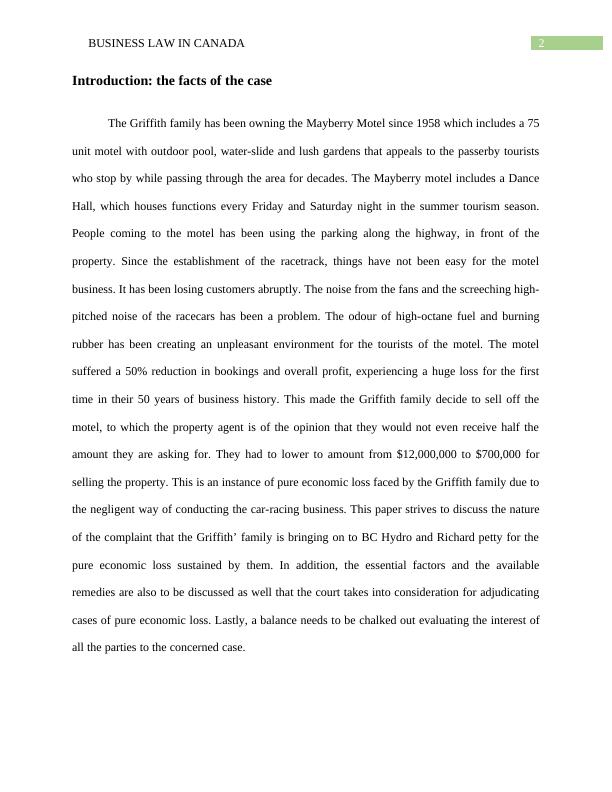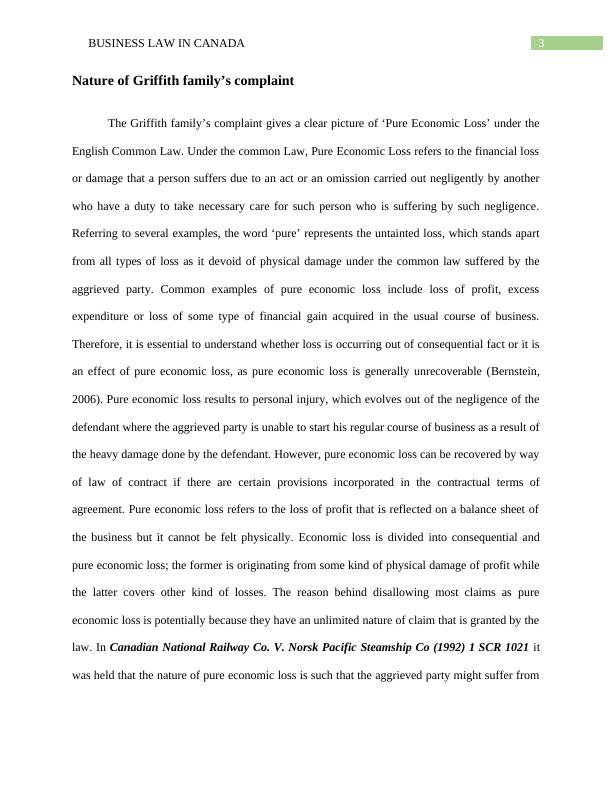Ask a question from expert
TMAS 5120 : Business Law in Canada
14 Pages3448 Words118 Views
Business Law (TMAS 5120)
Added on 2021-09-15
TMAS 5120 : Business Law in Canada
Business Law (TMAS 5120)
Added on 2021-09-15
BookmarkShareRelated Documents
Running head: BUSINESS LAW IN CANADA
Business Law in Canada
Name of the Student
Name of the University
Author Note
Business Law in Canada
Name of the Student
Name of the University
Author Note

1BUSINESS LAW IN CANADA
Table of Contents
Introduction: the facts of the case....................................................................................................2
Nature of Griffith family’s complaint..............................................................................................3
Claims against BC Hydro and Richard Petty..................................................................................5
Essential elements of pure economic loss considered by the court.................................................6
Remedies..........................................................................................................................................8
Similar Cases...................................................................................................................................9
Conclusion and Recommendation to balance the interest of both the parties...............................11
References......................................................................................................................................12
Table of Contents
Introduction: the facts of the case....................................................................................................2
Nature of Griffith family’s complaint..............................................................................................3
Claims against BC Hydro and Richard Petty..................................................................................5
Essential elements of pure economic loss considered by the court.................................................6
Remedies..........................................................................................................................................8
Similar Cases...................................................................................................................................9
Conclusion and Recommendation to balance the interest of both the parties...............................11
References......................................................................................................................................12

2BUSINESS LAW IN CANADA
Introduction: the facts of the case
The Griffith family has been owning the Mayberry Motel since 1958 which includes a 75
unit motel with outdoor pool, water-slide and lush gardens that appeals to the passerby tourists
who stop by while passing through the area for decades. The Mayberry motel includes a Dance
Hall, which houses functions every Friday and Saturday night in the summer tourism season.
People coming to the motel has been using the parking along the highway, in front of the
property. Since the establishment of the racetrack, things have not been easy for the motel
business. It has been losing customers abruptly. The noise from the fans and the screeching high-
pitched noise of the racecars has been a problem. The odour of high-octane fuel and burning
rubber has been creating an unpleasant environment for the tourists of the motel. The motel
suffered a 50% reduction in bookings and overall profit, experiencing a huge loss for the first
time in their 50 years of business history. This made the Griffith family decide to sell off the
motel, to which the property agent is of the opinion that they would not even receive half the
amount they are asking for. They had to lower to amount from $12,000,000 to $700,000 for
selling the property. This is an instance of pure economic loss faced by the Griffith family due to
the negligent way of conducting the car-racing business. This paper strives to discuss the nature
of the complaint that the Griffith’ family is bringing on to BC Hydro and Richard petty for the
pure economic loss sustained by them. In addition, the essential factors and the available
remedies are also to be discussed as well that the court takes into consideration for adjudicating
cases of pure economic loss. Lastly, a balance needs to be chalked out evaluating the interest of
all the parties to the concerned case.
Introduction: the facts of the case
The Griffith family has been owning the Mayberry Motel since 1958 which includes a 75
unit motel with outdoor pool, water-slide and lush gardens that appeals to the passerby tourists
who stop by while passing through the area for decades. The Mayberry motel includes a Dance
Hall, which houses functions every Friday and Saturday night in the summer tourism season.
People coming to the motel has been using the parking along the highway, in front of the
property. Since the establishment of the racetrack, things have not been easy for the motel
business. It has been losing customers abruptly. The noise from the fans and the screeching high-
pitched noise of the racecars has been a problem. The odour of high-octane fuel and burning
rubber has been creating an unpleasant environment for the tourists of the motel. The motel
suffered a 50% reduction in bookings and overall profit, experiencing a huge loss for the first
time in their 50 years of business history. This made the Griffith family decide to sell off the
motel, to which the property agent is of the opinion that they would not even receive half the
amount they are asking for. They had to lower to amount from $12,000,000 to $700,000 for
selling the property. This is an instance of pure economic loss faced by the Griffith family due to
the negligent way of conducting the car-racing business. This paper strives to discuss the nature
of the complaint that the Griffith’ family is bringing on to BC Hydro and Richard petty for the
pure economic loss sustained by them. In addition, the essential factors and the available
remedies are also to be discussed as well that the court takes into consideration for adjudicating
cases of pure economic loss. Lastly, a balance needs to be chalked out evaluating the interest of
all the parties to the concerned case.

3BUSINESS LAW IN CANADA
Nature of Griffith family’s complaint
The Griffith family’s complaint gives a clear picture of ‘Pure Economic Loss’ under the
English Common Law. Under the common Law, Pure Economic Loss refers to the financial loss
or damage that a person suffers due to an act or an omission carried out negligently by another
who have a duty to take necessary care for such person who is suffering by such negligence.
Referring to several examples, the word ‘pure’ represents the untainted loss, which stands apart
from all types of loss as it devoid of physical damage under the common law suffered by the
aggrieved party. Common examples of pure economic loss include loss of profit, excess
expenditure or loss of some type of financial gain acquired in the usual course of business.
Therefore, it is essential to understand whether loss is occurring out of consequential fact or it is
an effect of pure economic loss, as pure economic loss is generally unrecoverable (Bernstein,
2006). Pure economic loss results to personal injury, which evolves out of the negligence of the
defendant where the aggrieved party is unable to start his regular course of business as a result of
the heavy damage done by the defendant. However, pure economic loss can be recovered by way
of law of contract if there are certain provisions incorporated in the contractual terms of
agreement. Pure economic loss refers to the loss of profit that is reflected on a balance sheet of
the business but it cannot be felt physically. Economic loss is divided into consequential and
pure economic loss; the former is originating from some kind of physical damage of profit while
the latter covers other kind of losses. The reason behind disallowing most claims as pure
economic loss is potentially because they have an unlimited nature of claim that is granted by the
law. In Canadian National Railway Co. V. Norsk Pacific Steamship Co (1992) 1 SCR 1021 it
was held that the nature of pure economic loss is such that the aggrieved party might suffer from
Nature of Griffith family’s complaint
The Griffith family’s complaint gives a clear picture of ‘Pure Economic Loss’ under the
English Common Law. Under the common Law, Pure Economic Loss refers to the financial loss
or damage that a person suffers due to an act or an omission carried out negligently by another
who have a duty to take necessary care for such person who is suffering by such negligence.
Referring to several examples, the word ‘pure’ represents the untainted loss, which stands apart
from all types of loss as it devoid of physical damage under the common law suffered by the
aggrieved party. Common examples of pure economic loss include loss of profit, excess
expenditure or loss of some type of financial gain acquired in the usual course of business.
Therefore, it is essential to understand whether loss is occurring out of consequential fact or it is
an effect of pure economic loss, as pure economic loss is generally unrecoverable (Bernstein,
2006). Pure economic loss results to personal injury, which evolves out of the negligence of the
defendant where the aggrieved party is unable to start his regular course of business as a result of
the heavy damage done by the defendant. However, pure economic loss can be recovered by way
of law of contract if there are certain provisions incorporated in the contractual terms of
agreement. Pure economic loss refers to the loss of profit that is reflected on a balance sheet of
the business but it cannot be felt physically. Economic loss is divided into consequential and
pure economic loss; the former is originating from some kind of physical damage of profit while
the latter covers other kind of losses. The reason behind disallowing most claims as pure
economic loss is potentially because they have an unlimited nature of claim that is granted by the
law. In Canadian National Railway Co. V. Norsk Pacific Steamship Co (1992) 1 SCR 1021 it
was held that the nature of pure economic loss is such that the aggrieved party might suffer from

End of preview
Want to access all the pages? Upload your documents or become a member.
Related Documents
Tort Law, Liability, and Damageslg...
|14
|4326
|67
Tort of Negligence: Case Study of Peter the Real Estate Developerlg...
|7
|1700
|53
Assignment on The English Tort Lawlg...
|12
|3622
|339
Business law - Sample Assignment PDFlg...
|12
|2315
|77